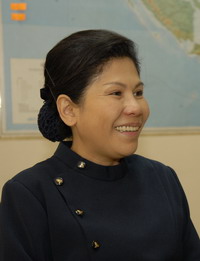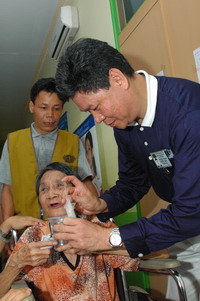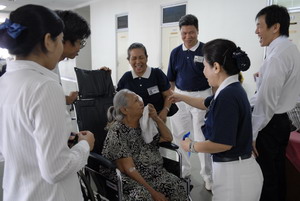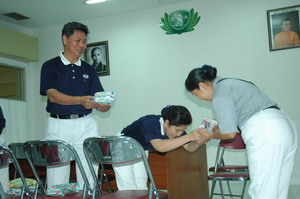Tzu Chi Jakarta Volunteer: Eva Wiyogo
Be On the Same Path
In almost every Tzu Chi social health service activity, her figure was never absent from serving patients. Her warnth smile and sincerity in serving, helps to ease the patients’ fears and anxiety before surgery. Eva was not alone, her husband Hendro Wiyogo often accompanied her. Both of them were present in pairs on many occasions.
While her husband accompanied and escorted the patients to the operating room, Eva was in charge of the eye examination section. There were a few times when one of them was busy, which is why they came alternately. "We try to manage our time.
For example rice distribution activity, when he (editor’s note: Eva’s husband) participates in the activity, then I help manage the shop. Moreover, if both of us can spare our time, then we will both participate in the activities. We think that being able to do a lot of good deeds is better than late,” Eva said, quoting the Master Cheng Yen's Jing Si Aphorisms.
Seeing, Be touched and Joining
Initially Eva has had a strong temper, but it has slowly changed since being active in Tzu Chi. Seeing the positive changes that occurred in his wife’s life, Hendro was curious and followed in her footsteps.
The story of Eva and her husband's journey becoming Tzu Chi volunteers began in 2003 when Eva’s friend introduced Tzu Chi to her. Similar to teenage love stories, her frequent encounters with Tzu Chi volunteers and listening to their stories have made Eva moved to become a regular Tzu Chi donator. "Even though at that time I didn't know what Tzu Chi was, I only simply knew that it was related to social activities," Eva said. At that time, Eva and Hendro were busy starting and developing their business, so there was almost no free time to participate in the Tzu Chi activities.
As if it had been defined as being part of the big family of Tzu Chi, in 2004, Eva's connection with Tzu Chi was established. Tzu Chi social health service was her gateway into the world of volunteerism. “I saw and I was touched. Since then I have been very interested. Even though I'm busy, I still set aside time to participate,” she said firmly. Together with other volunteers, Eva often surveyed and visited prospective patients for special treatment handled by Tzu Chi. “At first I thought it was just like any other social foundations. But this one (editor’s note: Tzu Chi) is extraordinary," the mother of 4 children praised.
Initially Eva has had a strong temper, but it has slowly changed since being active in Tzu Chi. "Everyone knows that business owners are emotional," she recalled. Her husband, Hendro Wiyogo noticed wonderful changes in Eva’s attitude. At first, he didn’t agree with Eva's activities which spent almost 80% of her time at Tzu Chi, but seeing the changes in his wife’s attitude, Hendro finally melted with her decision. "How can she change so much?" Hendro asked at the time.
Due to curiousity, Hendro tried to follow in his wife's footsteps. After seeing and being directly involved, Hendro was finally interested and joined Tzu Chi. Since then, the two of them have never been absent from Tzu Chi activities, especially the social health service.
In addition to the positive changes that happened in her life, Eva also felt touched and happy when she saw the beaming faces of the patients who had been successfully treated by Tzu Chi. “There was a person with vision impairment in both eyes who was able to see again. We were all proud of that, weren’t we?" Eva said. There was also a story of a patient who was touched and brought to tears when Eva washed his feet before entering the operating room. “The patient said that his son had never washed his feet in his entire life. It was the only time someone else was willing to do it. He said that he might not be able to repay the kindness, but God will definitely repay me,” Eva explained.
The Life Changing
Not only does Tzu Chi benefit others, it also has a positive impact on both Eva and her husband’s lifestyle. Before they getting to know Tzu Chi, along with their settled life and growing business made both of them lulled by success. “In the past, I never thought before shopping, I would buy goods as long as I liked. Especially when we went abroad, we would buy in bulk. We would buy anything, even though we didn’t need it. We would buy goods as long as we wanted," Eva recalled. As a result, the goods were just piled up in the house. "Those goods become piles of garbage," Eva said jokingly.
Their other bad habits were the hobby of going to karaoke and drinking. "In the past, after the shop closed at 9 pm, we went straight to karaoke until 2-3 am," both Eva and Hendro said in unison. Thus, they were rarely able to meet and interact with children. "When we came home, the kids were already asleep. When the children woke up, we were the ones who were still sleeping," Eva said blushing. An unhealthy and wasteful lifestyle. They spent quite a bit of money overnight.
"Everything has changed since we met Tzu Chi," both of them admitted. Eva and Hendro, who used to have a consumptive lifestyle and like to seek entertainment, have changed 180 degrees in their understanding of the use of money. “Now I think before shopping, is this item really needed or not? If not, why don't we use the money to help people," Eva replied. Apart from spending money wisely, Eva and Hendro were getting more and more introspective in social interactions. "We have reduced the habit of going karaoke and drinking alcohol slowly and then avoided both habits altogether,” Hendro said. As a result, they also rarely gathered with their friends. Even so, Eva remained good friends with them. Some of her friends were successfully suggested to become Tzu Chi donors. "They might didn’t have free time to participate in the Tzu Chi activities, but we can suggest them to be our donors," she added.
Eva and her husband who were originally lovers of malls and karaoke, spend most of their time at Tzu Chi now. Eva had almost completely left her business affairs, while Hendro was also slowly starting to leave his business and entrusting its management to someone else.
“I’m more active in Tzu Chi right now. The portion for business is only 10% left, while in past the portion was 100% for business,” Eva joked. Hendro has his own reason why they are now more focused on Tzu Chi activities. “Many of my friends died at a young age, they were in their 50s on average. From there, I thought that why do we have to force ourselves to collect a lot of money; after all, if we die, the money can’t be taken with us either,” Hendro said.
Hendro shared a few reasons why he joined his wife to be active in Tzu Chi activities. “I noticed some attitude changes in my wife. When I first called her and only said a word or two, she was already lashing out and hanging up the phone. But the current condition are different where she calls more often,” Hendro said with a smile. The man who had worked as a shop worker, salesman, and entrepreneur was also grateful that he and his wife were active in Tzu Chi activities until now. "Whenever my wife came home, I never either asked or suspected, believing that she was doing Tzu Chi activities. Vice versa. I know she has a goal, because we are both on the same path,” Hendro said. In fact, at every family gathering, there are topics of conversation about Tzu Chi being discussed. “I told you, uh, I visited a patient earlier, the situation was like this… and this. So, the family was affected. Now, many of my younger siblings are joining Tzu Chi," Eva said proudly.
Gloomy Childhood
"When other people only gave us used clothes, we were very happy to wear them. It was the same when they gave us rice. So, now when I see people who are economically struggling, it reminded me with my childhood." (Eva Wiyogo)
Looking at their current life, no one would think that Eva and Hendro had a bitter life experience since childhood. Born in Singkawang, West Kalimantan on November 26, 1957, Eva is the eldest of 9 siblings. "Actually 10, but one has died," Eva said tearfully.
Her father, Tjhai Jun-kim was selling pork to support the family. When the meat was not sold out, then her mother would process the meat into small pieces. "I was the one selling it, door to door," Eva recalled.
Because of her poor condition, since the age of 9, Eva was used to selling snacks made by her mother. “I carried the cakes on my head. They were heavy, but all I care about was getting money," she said lightly. Coupled with her status as the eldest child, Eva often carried her younger siblings on the back. "That's why I'm the shortest in the family," she joked.
Even though she helped support the family's economy, in fact Eva was only able to get an education up to fifth grade. "When I got money, then I gave all the money to my mom," Eva admitted. In 1972, Eva dropped out of school and followed her father, who had migrated to Jakarta a year earlier. Together with their mother and three younger siblings, they followed their father, who was selling pork at Blok A Market. In Jakarta, Eva and her sister didn’t just sit idly by. She helped her mother finish the sewing of clothes supplied from convection, while her two younger siblings worked with other people. The five of them lived in a relative's house while wandering in Jakarta. "So now when I see other people who are economically struggling, I imagine myself economically struggling," she said. Eva recalled her childhood memories. "When other people only gave us used clothes, we were very happy to wear them. It was the same when they gave us rice," said Eva said.
It was not easy for Eva to change from a beneficiary to a benefactor. Flashbacks of the life she has lived was quite winding, full of obstacles and challenges. It can be said that the sweet story of her life happened after she entered the marriage phase. Eva and her husband were both born in a small town, Singkawang, West Kalimantan, they didn’t know each other before. Their love relationship was actually established in Jakarta. Married at the age of 21 to Hendro Wiyogo, their domestic life was full of concerns at first. They opened a small convection with a capital of two sewing machines. "When there were no orders, then we also made screen printing. Besides that, my husband bought large vermicelli, wrapped them in small packages to sell to the market," Eva said. Both of them have the principle that whatever they can do, they will do. There is no laziness or prestige.
This effort was not in vain when they entered their fourth year of marriage, their economy gradually improved. The convection business, which was originally operated by two of them with the help of several relatives, eventually grew rapidly – employing 40 employees – and opened a clothing stores in Jatinegara Market and Tanah Abang Market. The progress of their business was inseparable from their business principles which highly uphold honesty and commitment to business partners. "We must not lie to people, we must keep our promises and be honest," Eva said firmly and agreed by her husband.
Even though their lives were much established and settled, Eva and her husband continued to work with the employees. "At that time, I didn't think about being a boss, the important thing was to try," Eva explained. In fact, both of them arguably worked twice as hard as their employees. But unfortunately, the golden age didn’t last long. In 1988, the convection business that was built by them with great difficulty had to go bankrupt. Apart from being deceived by business partners, another reason was that their six clothing stores in Jatinegara Market, East Jakarta were also completely destroyed by the fire. Eva and Hendro were in huge debts.
As a result of the incident, Hendro was shocked and frustrated. Eva took the initiative to take over control of the family economy and start a new business. Luckily, her brother who owns a watch business helped her by handing over one shop to be managed with a profit-sharing system. “At that time the watch business was really good. And also, I felt strong enough to work, so I dared to work from 9 am to 9 pm," Eva said. Since then, their lives have improved again. "I didn’t know where the blessings came from so that my business could grow rapidly," Eva explained. Her business started from one store in Melawai, South Jakarta, until now it has grown to three stores in Jakarta and ten stores spread across various cities in Indonesia.
After 30 years of marriage (editor’s note: married in 1978), Eva and Hendro have 4 children, namely: Dodi Hendro (26), Yunita (24), Angela Desica (22), and Stephanie (18). These four children all were living and attending school in United States. “I couldn’t go to school and I didn't want my children to be like me. Unintelligent and unskillful," she said humbly. Eva and Hendro didn’t want their children to experience the past like them, so they provided the best educational facilities, even studying abroad. Who would have thought, it turned out that the decision was not entirely correct. "I didn't know the development of my children living abroad, suddenly they had grown up," Eva and Hendro regretted. “What I knew was just making money, it had only been a few months since I visited them. Therefore, now that I have a lot of free time, I have to accompany them,” Eva added. Even if two of them were unable to visit their children, at least they would exchange messages with their children who were abroad.
Eva and Hendro often give advice to young parents not to rush to send their children to study abroad, especially if their children are young. "We feel we made a mistake on our past decision, so we don't want to let others make the same mistake as us," Eva pleaded. Another thing that bothered her was that she wasn’t by her children’s side when they needed her. "When they were sick, we didn't know anything. At that time, what we knew was just making money, so we didn't think about it that way. Sometimes I didn’t realize until the children shared their stories, when they were sick, their condition was like this. At the moment, we feel really guilty,” Eva regretted. The opportunity to educate and watch children grow was something that seemed to have disappeared from the lives of Eva and Hendro. “I used to think, everything had to cost money. When there was money, then every problem could be solved. It turned out that after we were getting old and getting to know Tzu Chi, I realized that money is not everything,” Eva and Hendro said.
As told to Hadi Pranoto
Photographer: Tzu Chi Documentation
Translator: Vincent Salimputra (Tzu Chi Volunteers)












 Sitemap
Sitemap